How cycling around the world taught Geordie Stewart the true meaning of freedom
Eight years after becoming the youngest Briton to conquer the seven summits, Geordie Stewart has added another feather to his hat. From escaping police in Xinjiang to freezing temperatures in Siberia, the adventurer tells Joel Day what he learnt from his solo cycling trip around the world
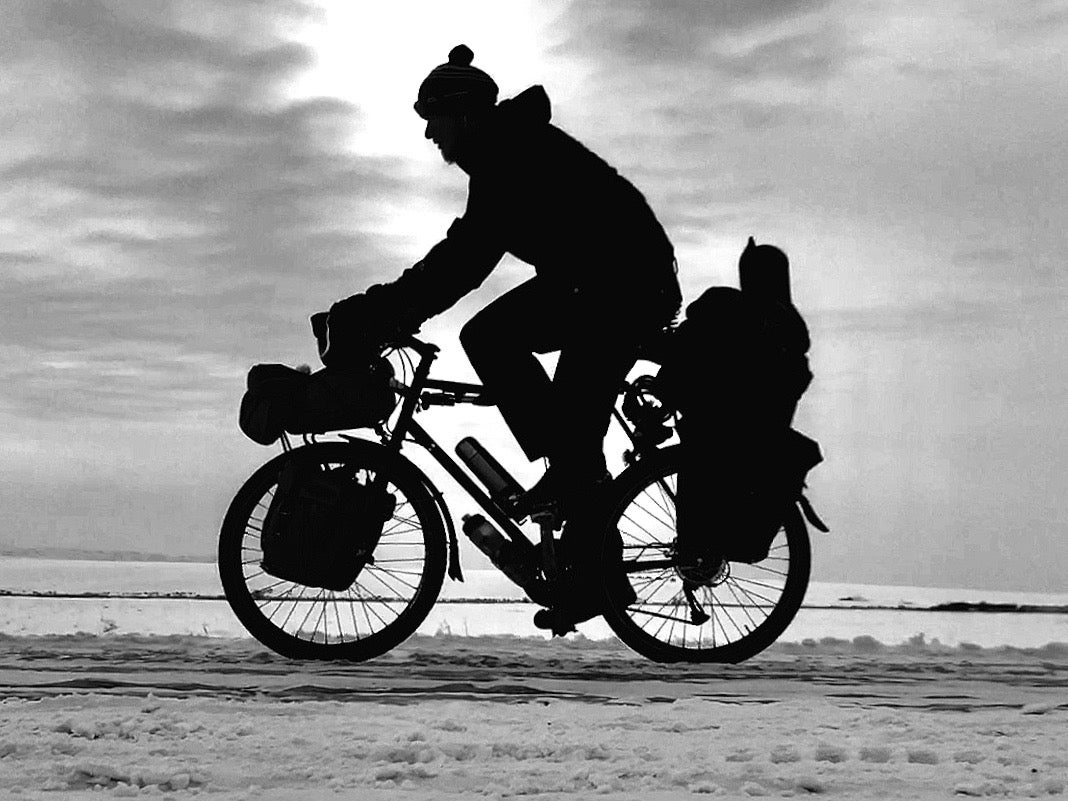
It is December 2018. Winter in Xinjiang, China, is at its peak. Daily temperatures average -20C. The slimy grey road is bordered by piles of grey slush. Fences topped with tightly coiled barbed wire tower over either side of the highway. Geordie Stewart is far from his sleepy Hampshire village.
Cycling through the border town of Tacheng, he has already been stopped five, six, seven times by Chinese police. It is only midday. On one of the highways, he sees a break, turns and veers onto a side road. Within minutes, using the thousands of surveillance cameras dotted around the area, the police have caught up with him. “Turn around. Get back on the road!” they shout. He submits and is again channelled onto the grey road that goes on forever. It is in this stint of the journey Stewart asks himself: “What am I doing here?”
Night falls and escaping the authorities he finds a spot to camp under a bridge. It is cold, he is alone and knows the police are looking for him. This is his life for three weeks as he cycles across a region of total scrutiny. For the Uighur Muslims who make up around 10 million of Xinjiang’s 22 million people, this is reality. He settles in the darkness of his tent and reads the last lines of Robert Frost’s poem, “The Road Not Taken”.
“Two roads diverged in a wood, and I – I took the one less travelled by, And that has made all the difference.”
Almost a year later, Stewart, 30, is sat across the table from me in a Brixton coffee shop clean-shaven, his hair slicked back in a single blonde sweep, a copy of the adventurer TE Lawrence’s Seven Pillars of Wisdom in front of him. His eyes dart from left to right as he talks about the experience. He is animated in his speech and checks his shoulder several times. His face is both weatherworn and boyish. Through a wry smile, he says: “It’s not a good thing for the soul to be by yourself under bridges in Xinjiang during Christmas and new year.” But that’s exactly where he found himself.
Three weeks ago, after cycling through 24 countries (he recites without hesitation: the UK, France, Monaco, Italy, Slovenia, Croatia, Hungary, Romania, Bulgaria, Turkey, Georgia, Azerbaijan, Kazakhstan, China, Vietnam, Laos, Thailand, Malaysia, Singapore, Australia, New Zealand, the US, Portugal, Spain and France) and 22,500 miles of contrasting geographical, political and social landscape, Stewart arrived home.
“There are easier ways to get to Australia. There’s a 17-hour flight to Perth if you want,” replied Stewart’s mum, Gilly, when he told her about his plan to cycle around the world. Flying was out of the question. His sights were set on a solo bike trip that was just as unnegotiable as the 9 August 2018 departure deadline he had set. “That was the day I was leaving my job. It was important for me to be unemployed and go – to be totally free and on my own, myself,” he says.
Stationed in North Yorkshire for five years with the army, he went on to travel the world with the Light Dragoons for both work and pleasure. But, it wasn’t enough. Being identified as a soldier made for responsibility, an expectation to behave in a certain way and represent his country. “I wanted to disregard this and become liberated in where I could go and what I could do,” he says. This, however, quickly became an answer to simply satiate the question: “Why are you going on such a trip?” Stewart didn’t know. The reason why proved an enigma. “I just liked the idea of getting as far away as I could.” He left London on that sunny August morning for Auckland not knowing what lay ahead of him.
Few activities seem to offer as fulfilling a time as travel. Most humans at some point in their lives yearn to be someplace else. While many grow out of their wanderlust, some never rid themselves of itchy feet. “I have seldom heard a train go by and not wished I was on it,” wrote Paul Theroux in The Great Railway Bazaar. It’s true. Something about a passing train or being in a train station instils an excitement. For Stewart, this excitement is true of a bike and the open road. “I wasn’t surprised when he told me about his plans,” says Hugh, Stewart’s dad. There was no reason for him to be either. On 26 May 2011 Stewart, at 22, became the youngest Briton to climb the seven summits. The world cycle tour, then, seemed a palate cleanser compared to tackling the highest mountain on each of the seven continents. “I was excited when he told me. There was more a degree of envy and the feeling of being a proud dad – compared to Everest, the scary one, I wasn’t worried. I always had faith he would get back safely.”
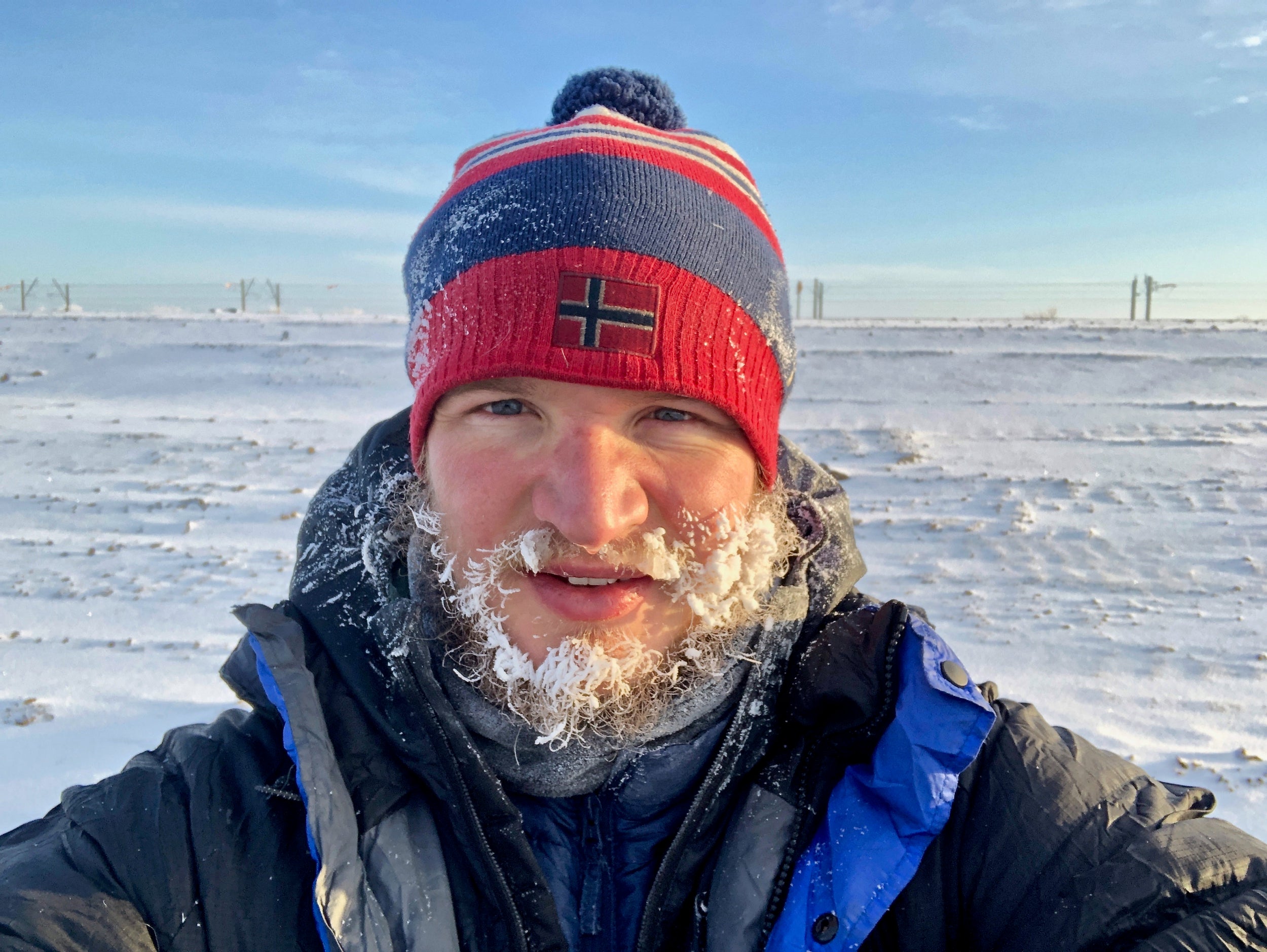
“It seems farcical putting up a post after five days with quite so long to go in this venture,” wrote Stewart in an Instagram post. He used the social media platform to blog his entire journey, and, on arriving at the village of Ruffec in the southwest of France, snapped a picture of his tent among a lanky field of corn.
The first part of the trip was about adjusting: his body, mind and way of life were intensely shaken up. “My arms, legs, ass, shoulders and neck have been shocked into trying to understand what’s happening,” he wrote in an Instagram caption. The humour masked an intense loneliness that was to persist throughout the journey. Emotions heightened, Stewart spent the majority of the first month in tears. Not floods of tears; but ones that streamed sparingly down his dust-laden cheeks after processing what he was actually doing. Getting further away, losing phone reception, spending hours with only the noise of the stones of the road hitting the spokes of his wheels to accompany him. The loneliness was liberating.
Southwest France led to southeast France, and around 18 days in Stewart reached Monaco. Attempting to cycle the F1 Monte Carlo track, he was stopped by police, his details taken. “I probably won’t be coming back anytime soon,” he said in an Instagram story. In the months to come, he would be stopped like this several times a day. It would leave an indelible mark on him.
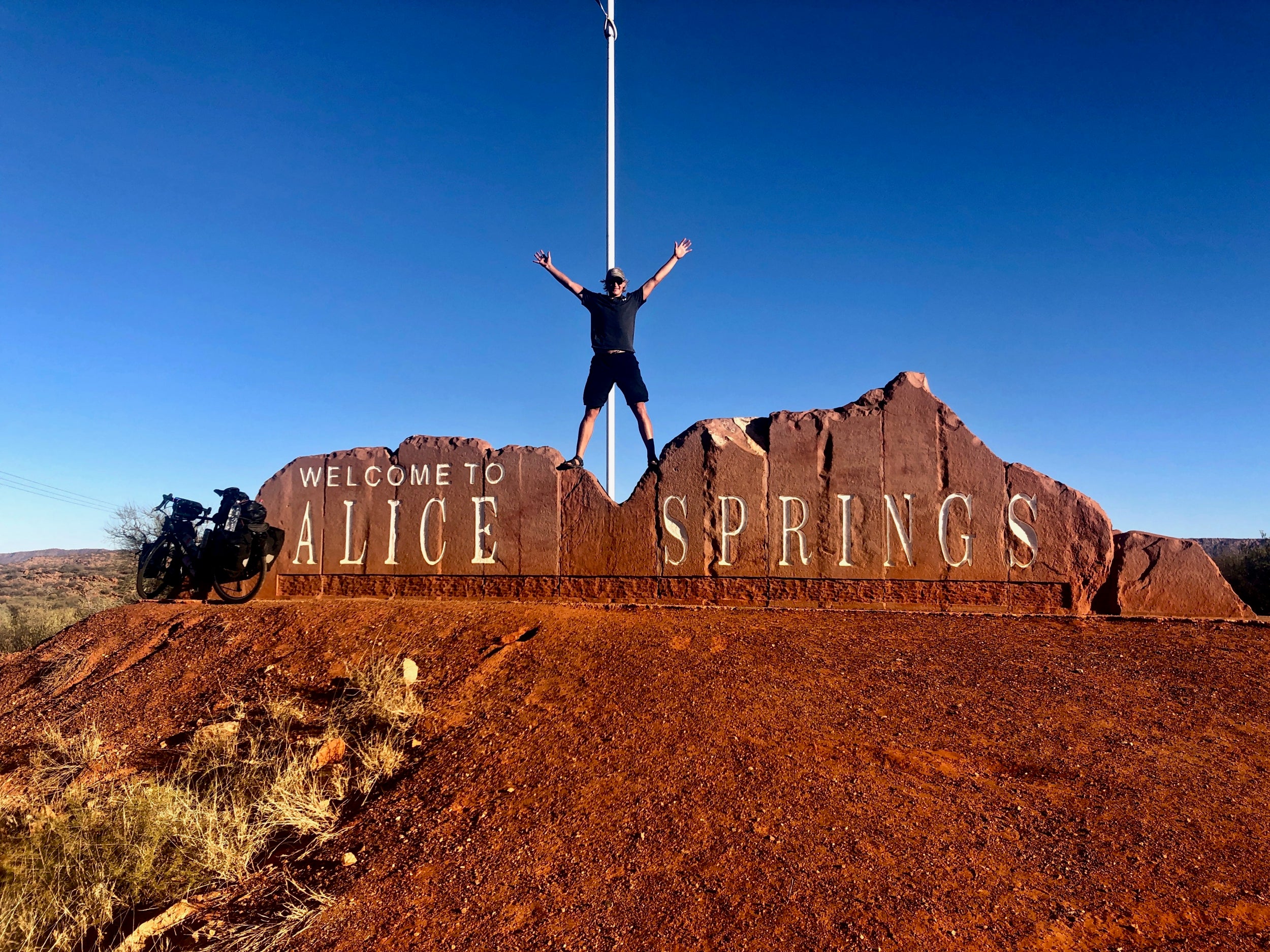
His entering Italy 20 days into the trip marked the first of many encounters with strangers. Heading into the north through its alpine region, he crossed paths with a man called Marco. He was to be Stewart’s host for the night, offering food, a bed and a shower. The same happened cycling through central Italy, bumping into Simone. And, again, with Luca, a man with four dogs, three pigs and two donkeys in the city of Mantua. Being alone in a remote place meant Stewart posed little threat to anyone while simultaneously providing endless intrigue. The outcome might have been different had he been cycling through a British town. His accent, where he was from, the preconceptions with someone’s background prevalent in other parts of life would likely have painted him as just another person, enemy or foe. Yet it was here that, bridging the cultural gap, leaving Brexit behind, ignoring the surge of the far-right in Italy, Stewart was forced to communicate and form a connection with three strangers.
He tore through the miles in the next few days. By day 26, he had cruised through Slovenia, Croatia and Hungary. Stopping at a countryside cafe in the Slovenian mountains, he bought a coffee. The owner, on seeing someone so clearly foreign, enquired and the pair got chatting. Jarja, the proprietor, bought Stewart a pizza and three more cups of coffee, because, she explained: “I like to think kindness comes around to those who give it out so that’s how I have tried to live my life.” In travelling on a bike, Stewart slowed his experience of eastern Europe down to a leisurely pace. There was no hotel to check out of. No flight to catch. No curfew. How fast or slow he progressed depended on how fast or slow he felt like going. He was unfettered by not having to adhere to the constraints of a fast-paced life, allowing him to observe, absorb and appreciate the beauty that surrounded him.
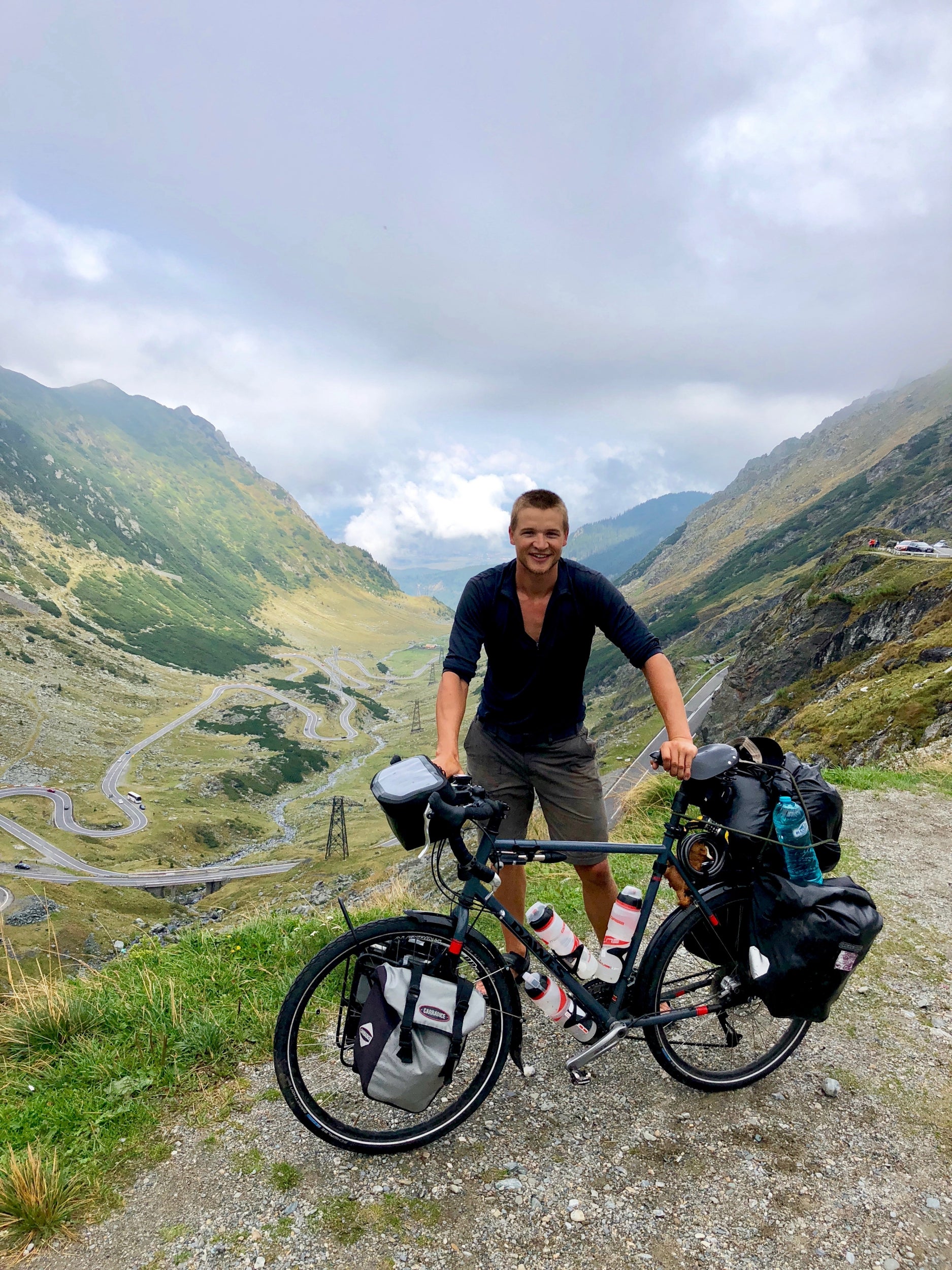
“Our society is really fast-paced, we’re working all day and we can’t escape work when we leave to go home,” he says. “On a bike, on the road, you see things slowed down – you’re completely exposed to, and immersed in, the elements which I think is a really nice thing. You witness a gradual change of scenery and smells and everything else you sense. You can’t often do that in normal life. It’s an important part of travelling.”
The Transfagarasan Highway is Romania’s most spectacular road: 60 miles of winding tarmac touching the southern tip of the Carpathian Mountains. Made mainstream by Top Gear in 2009, the road was built under communist rule in 1974. It took Stewart a gruelling four hours to tackle its steep incline, the highest point reaching 2,042 metres above sea level. Romania turned into Bulgaria, and by day 37 he had made the historic checkpoint that divides Europe from Asia. It was September 2018 and Stewart had reached Istanbul. What better time than now to call his mobile phone network provider.
“’I’d like to cancel my contract please’.
“‘I’m sorry to hear that, sir. Is there anything we can do to persuade you otherwise?’
“’Fraid not, I’m going to be out of the country for a while’.”
“I didn’t want a Turkish SIM card,” he tells me. “I wanted to be free for a few days.”
Riding through Istanbul was the scariest experience up to this point. The city’s notorious motorways, where lanes number up to six at a time, ignore cyclists who seldom come through these parts. Nestled among trucks and lorries, Stewart battled to make his presence felt: culminating in his smashing into an open taxi door. Clutching his gushing collarbone, he feared the worst. His attention was drawn to Dorothy, his bike, worried that she might be broken beyond repair. Cursing himself and the taxi driver, he found himself in a total rage. He cautiously restarted his journey, only to be nearly knocked under the path of a freighter by a kamikaze pigeon aiming itself at his head. This was made all the worse since he had recently parted ways with some family members he met in the city.
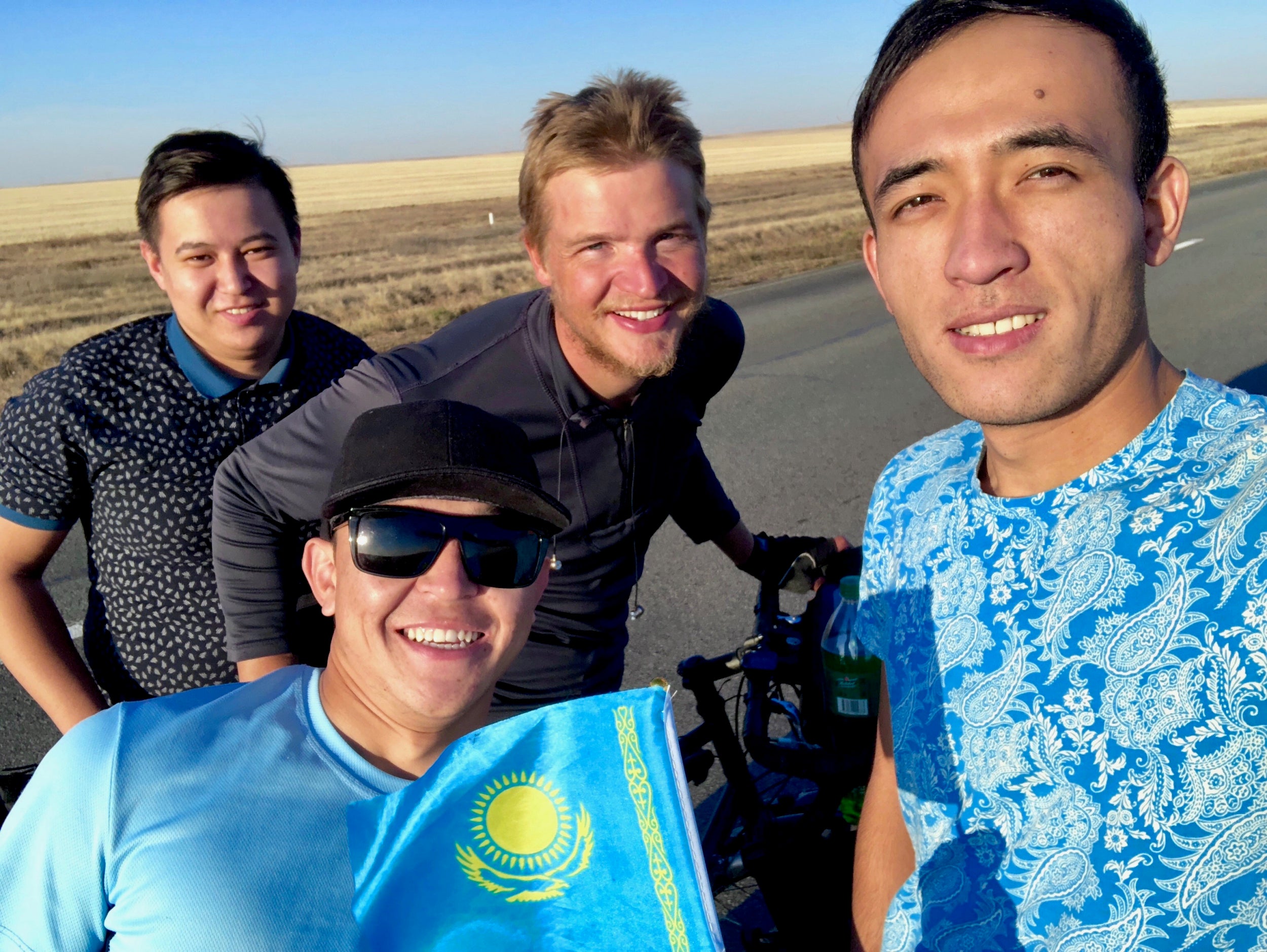
This had been a comforting aspect of his trip: passing meetings with family made for an intermittent sense of familiarity in his isolation. He always had some sense of home to look forward to with each geographical dot he joined. What lay ahead was the expanse of Asia with no one to call in on. Crossing northern Turkey, briefly dabbling in Georgia and Azerbaijan, he sailed across the Caspian Sea on a commercial ship. His next stop was Kazakhstan. He didn’t know what to expect.
Enveloping most of central Asia, Kazakhstan is the largest country in central Asia, which includes Afghanistan, Kyrgyzstan, Tajikistan, Turkmenistan and Uzbekistan, each known for their abundance of precious metals and natural resources. Kazakhstan’s capital, Nur-Sultan (called Astana until March 2019) has been dubbed the black gold city of the world. Its plentiful supply of oil has flowed since the days of Marco Polo. Gaining independence from the Soviet Union in 1991, it became an upper-middle-income country within 20 years. Its abundance of wealth runs contrary to its lack of human rights, its lack of democracy and its lack of wealth distribution. This is something Stewart became very aware of after cycling almost 2,000 miles from the port city of Aktau to the capital. The journey there was barren. Roads shoddily maintained, impoverished villages. Nur-Sultan is the country’s polar opposite: towering skyscrapers, futuristic architecture meticulously planned. Its presidential palace could be mistaken for one of the United Arab Emirates’ Palm Islands from satellite photographs. “It’s like a saucer on a blank table, an oasis in a desert,” Stewart says. Stuck in Nur-Sultan for nearly a month in November 2018, sorting out visas for the next part of his trip, he developed a soft spot for a country whose people he feels are misunderstood.
He smiles fondly when talking about it: “I don’t agree with a lot of the politics, but people were good to me there. I was taken in a few times. I was asked to give lectures to schools and they listened intently to what I said. I had some funny nights in Kazakhstan.” These consisting mainly of drinking vodka with truck drivers. “I’m talking glasses of the stuff, not shots,” he says. “They get very disappointed if you don’t get it down you fast.”
It was an amazing experience. Your whole existence is reduced to the simplicity of your surroundings, you know you’ve got enough food and water to sustain you, so your thoughts wander. You become fond of sunrise and sunsets, the eagles that fly overhead, the emus and kangaroos that run across the road. It’s an extraordinarily powerful place
Winter had begun and temperatures were regularly dropping to -44C where Stewart was now heading, the Siberian Steppe. Here, he would camp overnight, a knife by his side in the case of a wolf attack. Or worse, bears. The lone cyclist would become as desolate and removed from reality as his surroundings. The bitter cold would kill him in a few hours if he was not careful. His thermos broke, he could not use his phone out of fear of frostbite, and using it inside his sleeping bag meant the heat would escape. At first, it was fine. Cycling all day, sweaty and exhausted, his tent was a refuge. The first hours of sleep were bliss. But when he awoke, it was still dark. The nature of Siberia’s winter – 21 hours of perpetual darkness – meant hours of laying idly alone without stimulation. “When you’re in this situation you don’t know if you’re going to be OK. Your focus is reduced more and more. Your thought bubble is massively concentrated,” he says. For Stewart, past and future had ceased to exist. All that was on his mind was the present: packing his tent; pedalling; unpacking his tent; repeat. His experience of the now was intense. “It was really miserable,” he admits. But, it allowed him to enter a different frame of mind, one that he is grateful for having experienced:
“Two roads diverged in a wood, and I – I took the one less travelled by, And that has made all the difference.”
Why take on such a momentous task? Stewart doesn’t entirely know. He has several floating ideas: “I wanted to get away,” “I wanted freedom,” “I wanted escapism,” “I wanted a big adventure.” But, he acknowledges, they are all very broad reasons. “People usually talk about inner journeys (improving themselves), or outer journeys (seeing the world),” explains Emily Thomas, a philosopher at Durham University who has recently focused her attention on the philosophy of travel. “Solitude can heighten both inner and outer journeys. Being alone on inner journeys helps us listen to ourselves. For outer journeys, solitary travel can help us to engage with the world around us.” Thomas says that to be human is to be fascinated by borders, an integral part of travelling. “It’s about going from one country to another, the familiar to the new, even watching ourselves evolve.”
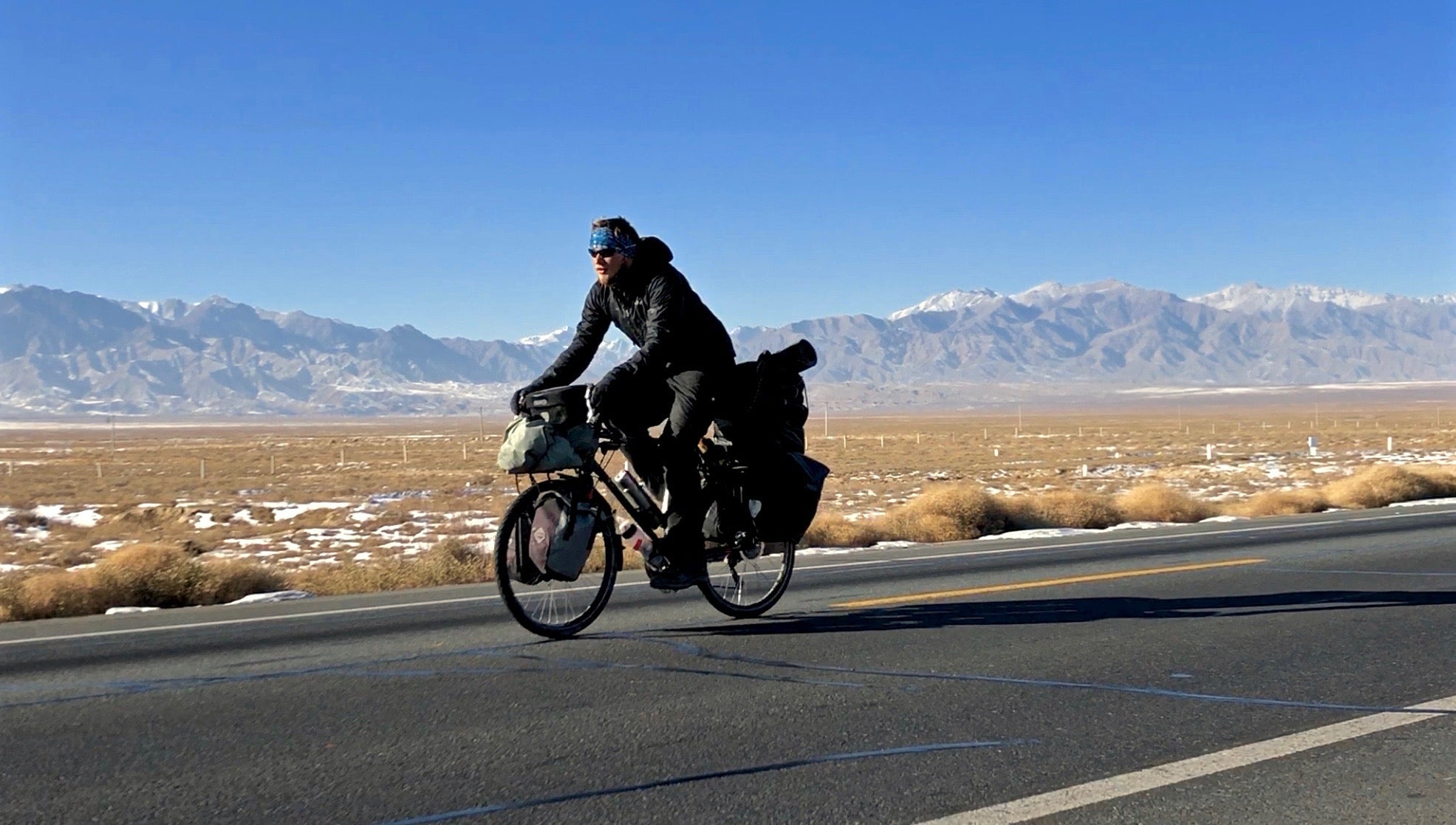
She reflects on adventurer Ella Maillart’s meditations on her 3,500-mile trip from Beijing to Kashmir: “This is the main reason which makes me prefer to travel alone: a companion is in himself a detached ‘piece’ of Europe and he is bound to behave according to his breeding; thus his reactions will contribute to keep alive in me a European frame of mind. I dislike it because I want to forget my western outlook; I try to become blank inside so as to let the journey sink deep in me. In that way I can grasp better what I see; I can feel the whole impact made on me by the newness I meet at every step. When I have a companion by my side, together we build a foreign cell, a ‘resistance’ which can only with difficulty blend into new surroundings.”
It wasn’t very long after Stewart had crossed into Xinjiang, China, from Kazakhstan, that the first seeds of doubt about the trip began to sprout. China’s most westerly province has, as of recent, been subject to both political and journalistic scrutiny after the full scale of its persecution of the ethnic minority population, the Uighur Muslims, became apparent. Its clamping down can be traced to 2012, when the then leader of Xinjiang, Zhang Chunxian, first used the term “de-radicalisation” in a report into how to solve the issue of separatism, extremism and terrorism involving Xinjiang’s Uighurs. The multi-faceted programme has since materialised as one aligned with an Orwellian state, with President Xi Jinping in 2016 setting out plans for “sinicisation” – a process whereby the Uighurs are assimilated into Han Chinese culture.
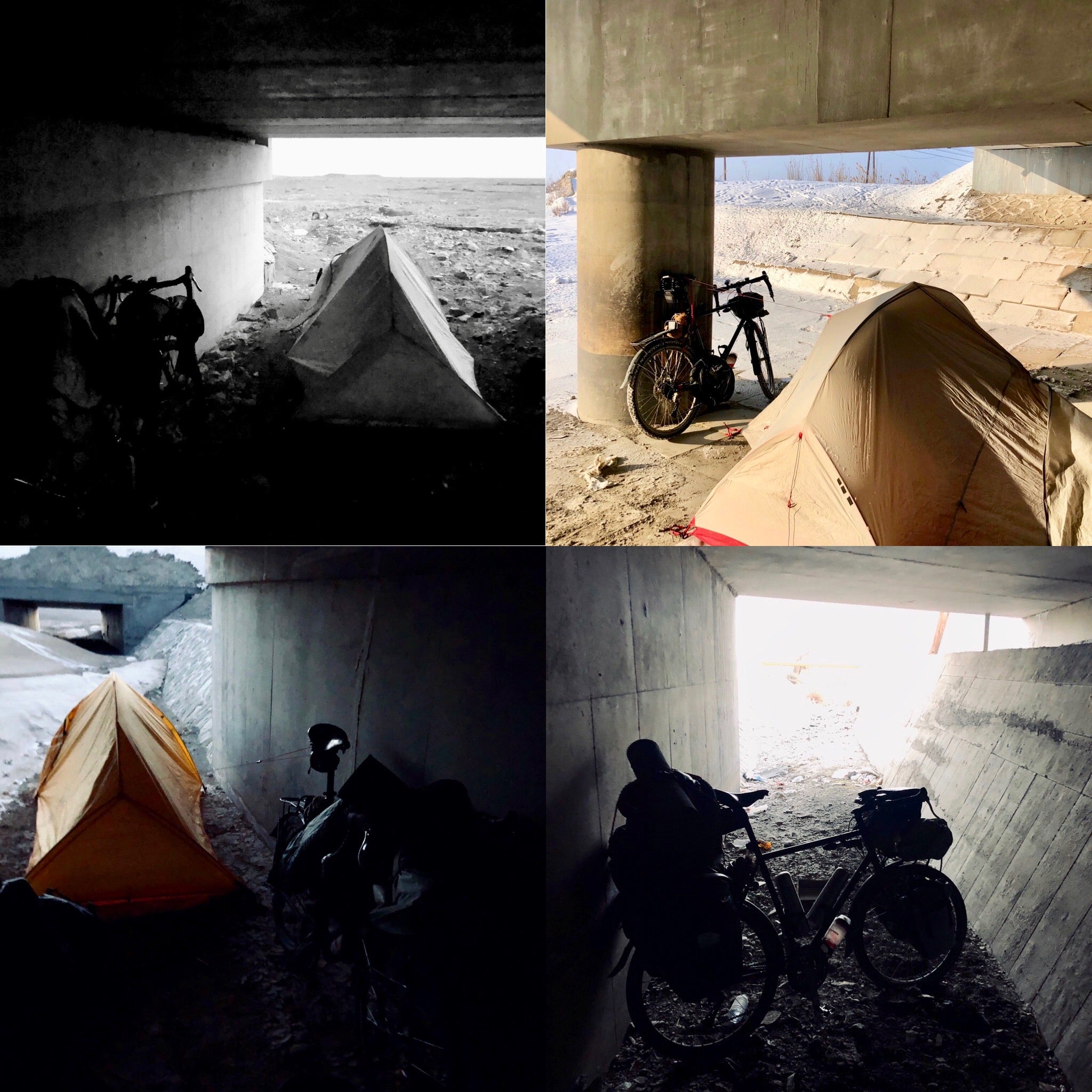
Xinjiang has also become China’s testing ground for its mass surveillance programme. Checkpoints have iris and body scanners, with the authorities harvesting DNA and blood samples from every citizen in the region between the ages of 12 and 65 – even those not suspected of crime. Since 2017, every vehicle in the regions Bayingol prefecture has been required to carry satellite tracking devices. When an ex-British army soldier sauntered freely across the border on a bike, the complete antithesis of the Xinjiang project, police were ready.
Tacheng was the border town through which Stewart entered. “There were red and blue lights everywhere,” he says. His bike and passport and phone were confiscated by the police and he was quizzed about his reasons for being there. When asked if he had come to Xinjiang to learn about the Uighurs, he replied: “Who is Uighur?” It worked, he says, with the line of questioning dropped and his being escorted to a hotel. The next day, he awoke to a phone call which he recounts in a blog post for UnHerd: “Hello, Mr Stewart, we are from Chinese Internal Affairs. Can we have a conversation downstairs in 10 minutes?” It was one of several similar conversations he had with the authorities. One that gradually chipped away at his morale and sense of adventure that was hitherto in abundance. “I didn’t feel very comfortable with it. It makes you feel very self-conscious, even though I wasn’t doing anything wrong.”
Ten years ago, China had 2.7 million cameras. By the end of the decade, it will have 400 million. Thousands of these facial recognition cameras watched Stewart’s every move. They watched him cycle along the barbed wired highways. They watched him cross each security checkpoint. And they watched him slow down as he cycled past one of the “Vocational Skills Education and Training Centres” where it is thought up to 1 million Uighurs are being captive held because of their religious beliefs.
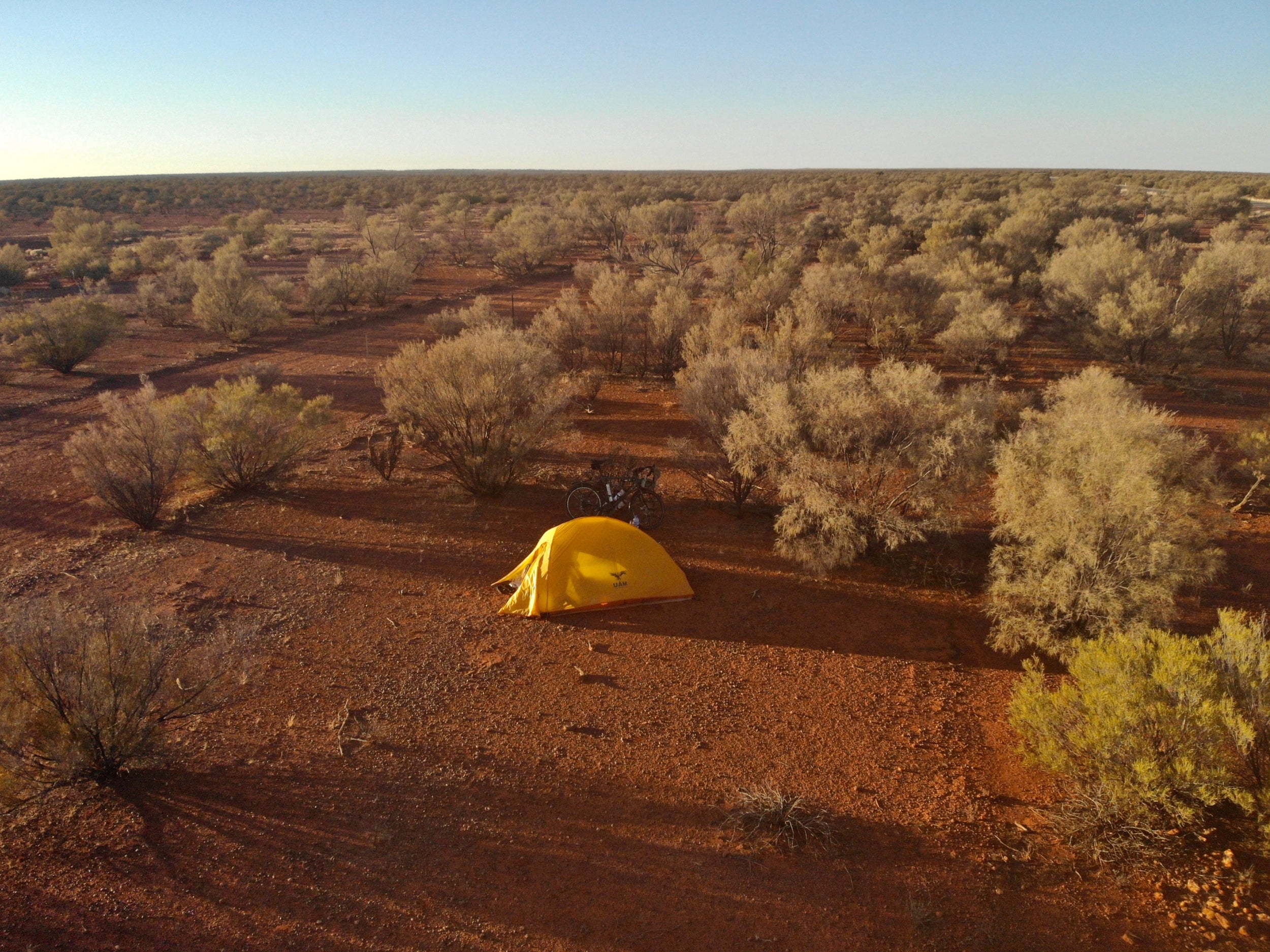
A stark contrast with Kazakhstan, Stewart’s mind was on the future in Xinjiang. “All I could think about was leaving,” he says. “I thought everything would be different – everything. Not just the politics, but the environment, the weather, the food, the people. Sunshine and rainbows would emerge as soon as I crossed the border.” Leaving Xinjiang, the barbed wire stopped and he didn’t encounter police for the next 3,000 miles. But it was too late. China had been tainted. “I was embittered by the experience,” he says. Crossing into Laos and the rest of southeast Asia, then, was a relief. It offered a fresh start, new adventures and the prospect of meeting friends after being alone for 7,000 miles.
“What will you do if you leave the army and we split up?” asked an ex-girlfriend a few years before the trip. “I don’t know,” replied Stewart nonchalantly. “Cycle to Australia.” He had never been down under and was deeply drawn to the country. His mum had travelled there 30 or 40 years ago and spoke fondly of it. An affinity for deserts, on arriving in Australia in April 2018, he decided to cut straight through the outback, north to south. He met several Antipodeans, who, when Stewart told of his journey from the UK, would reply: “Oh, what ya do? Swim here, mate?” To be the brunt of a joke was a curious relief.
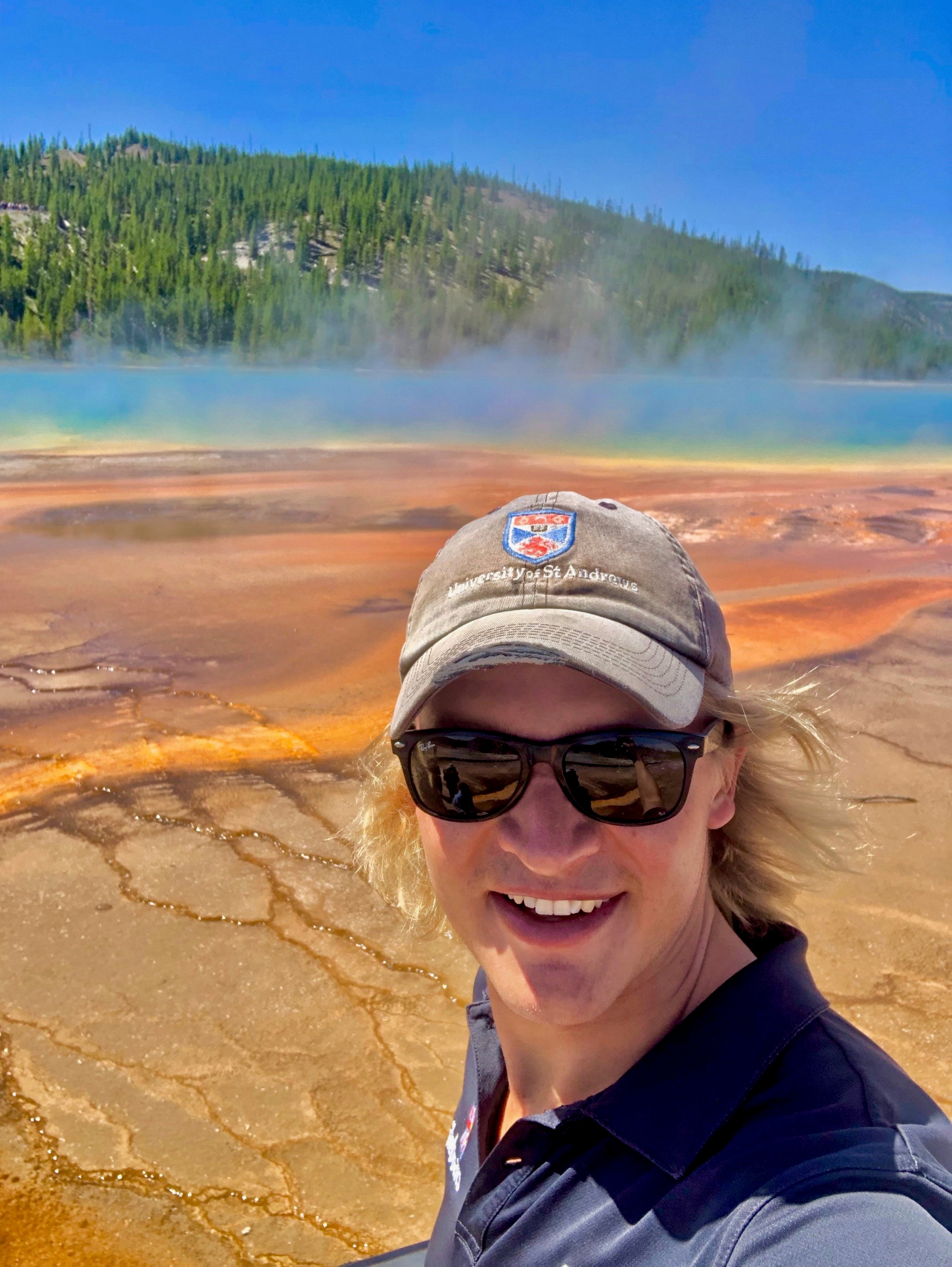
Stewart entered a state of zen in the sterile landscape of the outback. He became obsessed by his shadow and the way it splashed across the road as he moved with the day. Entranced by the repetitive motion of his pedalling. “It was an amazing experience. Your whole existence is reduced to the simplicity of your surroundings, you know you’ve got enough food and water to sustain you, so your thoughts wander. You become fond of sunrise and sunsets, the eagles that fly overhead, the emus and kangaroos that run across the road. It’s an extraordinarily powerful place.” It is something he thinks everyone should experience.
On Monday 19 July 2019 Stewart reached Auckland. He had been on the road for 345 days. Sat on his saddle for an accumulated 1,500 hours. It was supposed to be the final destination of his trip. “I had a feeling that I would want to go onto somewhere else when I got to Auckland, because ending there would have felt incomplete,” he says. He posted three new routes on his Instagram story and gave his followers the option to vote for where they wanted him to go next: Africa, South America, the US. Though, he had already made his decision. It was more of an experiment to see how the minds of his followers worked. They voted for South America, but as Stewart explains: “It would have been an amazing trip, but I didn’t want to spend another seven or eight months away. I would be in Argentina right now if I’d have gone, maybe Chile, which is an absurd thought.” Cycling across the US had been on Stewart’s bucket list since he was a teenager. Changing his flight to San Francisco, a huge sense of relief washed over him. “It felt like that’s what I should be doing, where I should be going.”
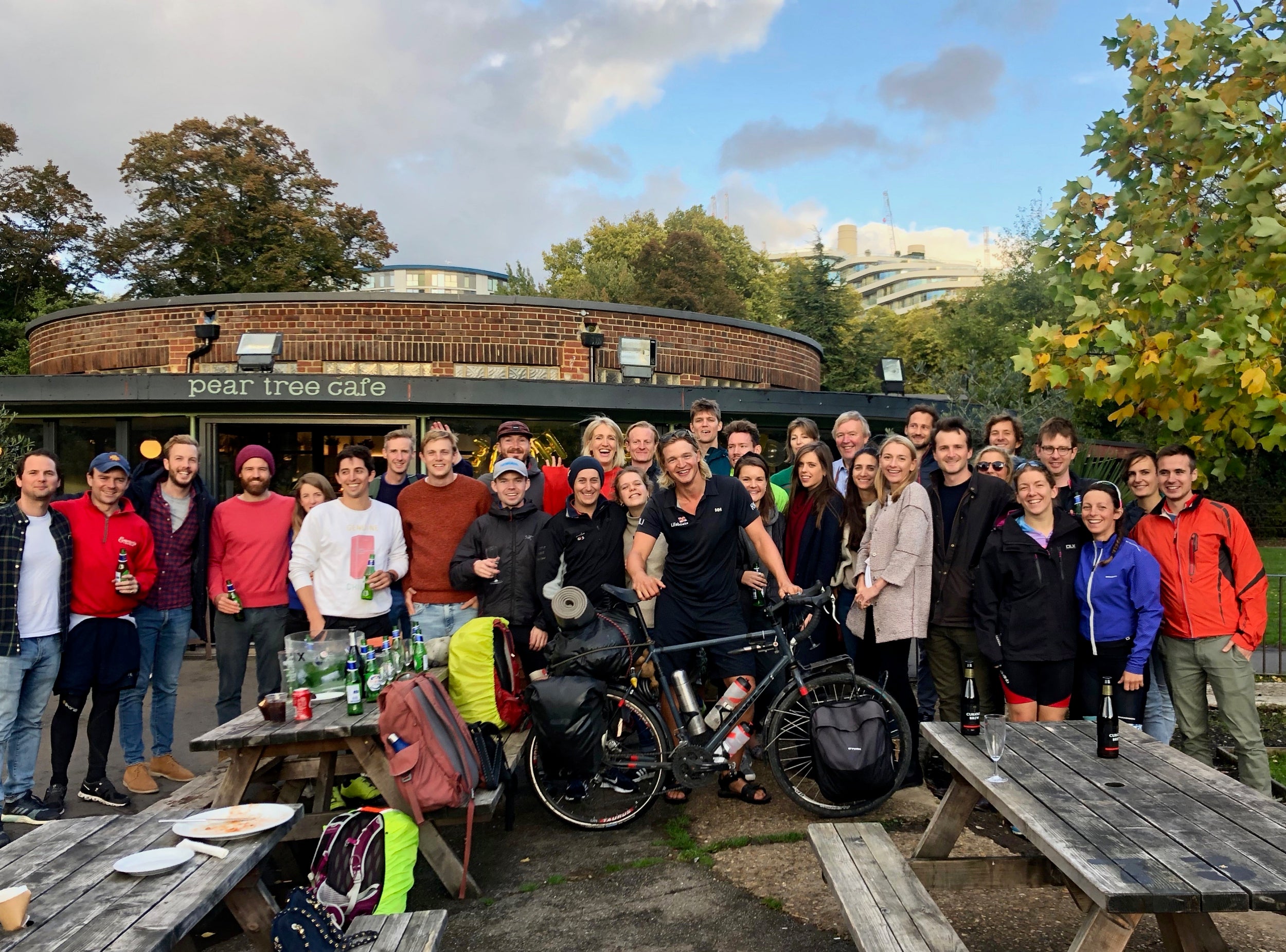
The Democratic Party presidential primaries were in full swing when Stewart landed in San Francisco. He found the people he came across were much more willing to air their political views out in public compared to those at home. “It was very much flag in the sand territory. It’s either loads of anti-abortion banners or pro-abortion banners, Trump/Pence posters or Kamala Harris posters. It struck me that people’s identity is very much entrenched in their politics.” He met and stayed with one family who boasted being “one of only two Democrat families in the whole town”. Not that they advertised it. It was just a fact any passerby should know.
This environment of political discord was often turned on its head by the least likely of people. Cycling through the Nevada desert, camping out in temperatures soaring 44C, cowboys in their pickup trucks stopped to give him water and asked where he was heading. One group took Stewart to a bar and plied him with drinks. “Donald Trump is just trying to make the world a better place, people are just too stupid to realise it,” said one drunken cowboy. “I was really glad they told me that,” says Stewart. The night ended in his staying at their ranch. The next few hours on the bike the following morning were a task, but all worth the experience of drinking with and talking to and learning from real people.
A conversation with a shopkeeper in the middle of Nebraska days later went something like: “Ah, you’re from Australia?’ ‘No, I’m from Britain.’ ‘Oh, what do you think about Boris?’” Even in the deepest parts of the American midwest, Johnson manages to capture the attention of people so far removed from him.
Getting to New York meant he had completed his dream of crossing the US and duly took a flight to Lisbon for the last leg of his journey. It was during this point in the trip that Stewart felt extremely relaxed. He became a tourist. It was nice to see the familiarity of European architecture. To hear Portuguese, Spanish and then finally French. Here, in Paris, he was joined by a group of friends who would cycle with him to London. At Dieppe, he took a ferry to Newhaven, where it began. “Seeing the coast of the UK again from the boat brought tears to my eyes.” The scene offered a moment of solitary reflection on how he had felt when leaving a year before. Arriving at Newhaven, a knot of excitement wrenched in Stewart’s stomach. London was within reach. Edging on the fringes of the city, his dad joined the group on his foldup commuter bike. Waiting for him at the Pear Tree Cafe in Battersea were countless friends and familiar faces. His journey was complete.
Stewart, 30, is sat across the table from me in a Brixton coffee shop clean-shaven, his hair slicked back in a single blonde sweep, a copy of the adventurer TE Lawrence’s Seven Pillars of Wisdom in front of him. He’s still not sure why he went on the journey. But, by the time our conversation ends, he says: “My friends are the same age as me. They’re getting married and having children and I think I made a conscious decision to stray away from that. I constantly read a poem when I was on the trip and the last lines are important because they really resonated with me.”
“Two roads diverged in a wood, and I – I took the one less travelled by, And that has made all the difference.”
Join our commenting forum
Join thought-provoking conversations, follow other Independent readers and see their replies
Comments